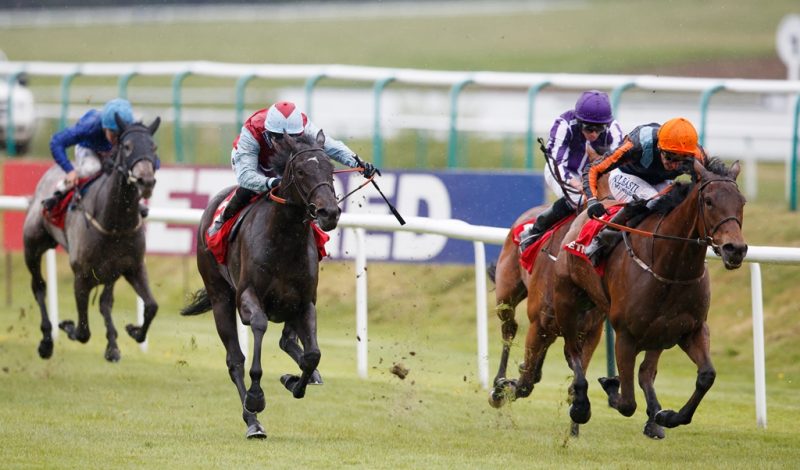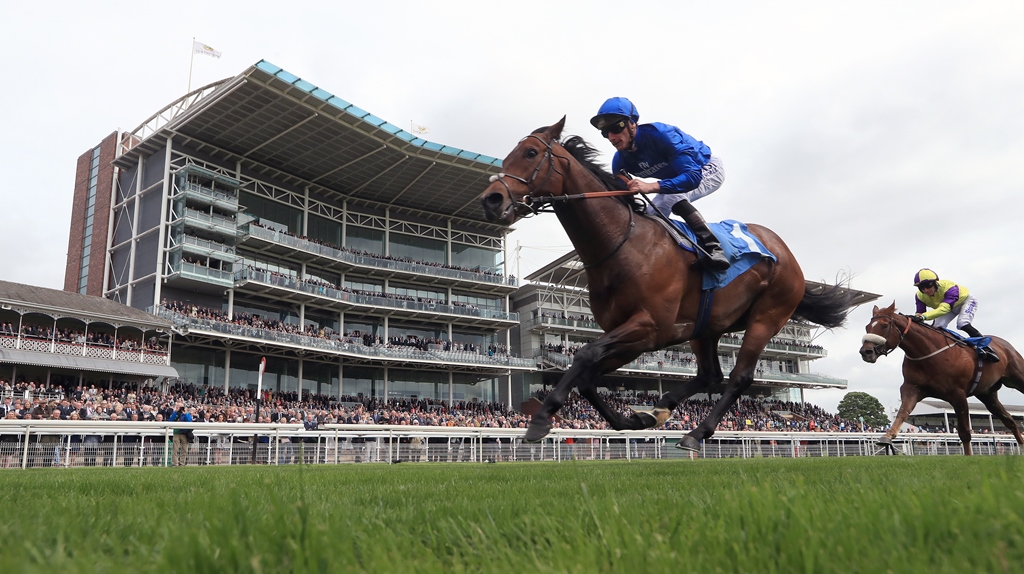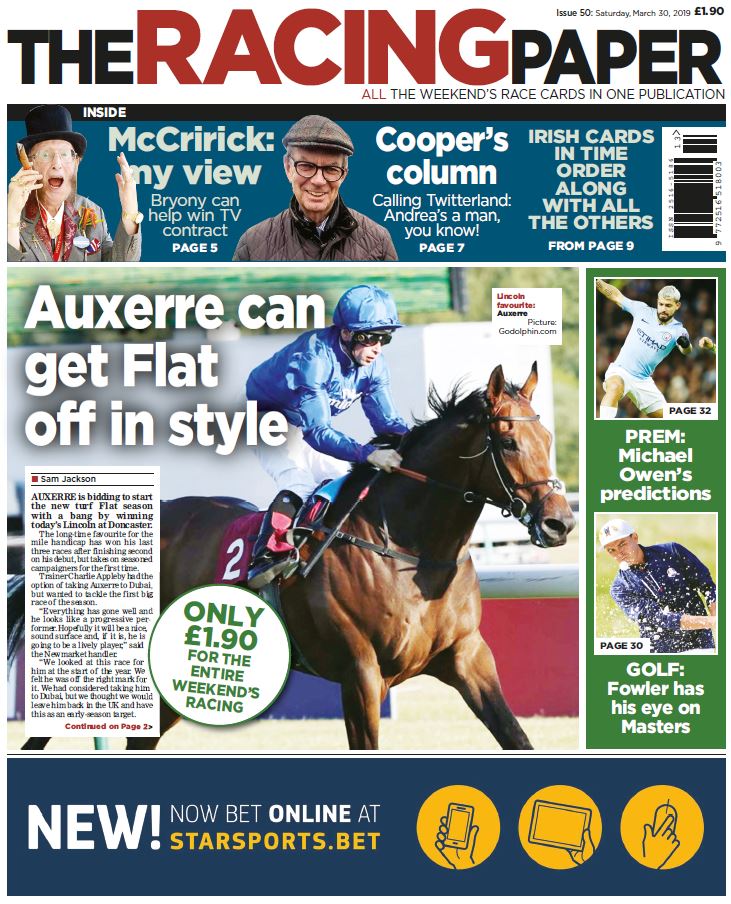Epsom
Perfect Clarity is the apple in Cox’s eye for the Oaks

(Photo: PA)
By Nick Townsend
Though the suspicion was that jump jockey Clive Cox may just possess the qualities to flourish beyond the weighing room, it would have been stretching it to believe, that, three decades on, he would be master of a 130-horse Flat stables in Lambourn.
Nor that his charges would include the likes of the lightning quick Harry Angel, one of the leading sprinters in Europe, and that his unbeaten filly Perfect Clarity would be a live contender for Friday’s Investec Oaks.
But here he stands, ten days before the fillies’ Classic, surveying the spectacular contours of Epsom, having seized the opportunity for Perfect Clarity, his daughter of Nathaniel – also the sire of last year’s Investec Oaks and Qatar Prix de l’Arc de Triomphe victor Enable – to stage a two-horse rehearsal (accompanied by stable companion Luire) on the idiosyncratic course under big-race rider Adam Kirby.
“This (gallop) wasn’t designed to see how fast she can go,” Cox explains. “Today was simply an exercise to give her more confidence. As far as I’m concerned, she’s a very nice, talented filly and she clearly stays. I’m very relaxed that she’s going to come here in good nick. But it’ll be a very hot race.”
As racing’s most potent forces assemble ahead of the Epsom Classics, with speculation rife on intended runners, caution can often be the overriding feature of many trainers when questioned about their representatives’ prospects.
Cox, right, though, cannot conceal his belief that Perfect Clarity, who won the Listed Betfred Mobile Oaks Trial Fillies’ Stakes at Lingfield a fortnight ago, will relish the task ahead.
Admittedly, the last filly to complete the Lingfield Oaks trial-Oaks double was Henry Cecil’s Ramruma in 1999. Cox’s Miracle Seeker won the Lingfield trial in 2008, beating Ralph Beckett’s Look Here, but it was the latter who went on to take the fillies’ Classic that year.
Miracle Seeker, a 40-1 shot, finished 11th and that was the first and last occasion the stable has contested the Epsom prize.
However, the trainer says of his filly, owned by Dr Bridget Drew, a stud owner who was an international authority on cattle reproduction in her working life, and David Keast, a retired sales executive: “I think the 20-1 (down to 14-1 with some layers) odds about her are very brave – I wouldn’t be going that price. She is a good each-way bet and she is a filly that I have enormous confidence in. I think she will really acquit herself very well.”
All a remarkable contrast to the early career, I suggested, of a man I’d first encountered when he partnered a filly I owned with the long-retired trainer Charlie James (finishing third on one occasion).
You do suggest that it would have been the more obvious route to continue working with National Hunt horses once he departed the riding arena.
“Possibly,” he agrees. “But I rode a lot of work on Flat horses when I was a jump jockey and the quality of the individuals you’re dealing with is what excited me. It was like going from driving a rally car with jumps racing to F1 with the Flat horses.”
He adds: “I never thought as a jump jockey that was the ultimate for me. But it was never a case of ‘what do I do when I’ve finished riding?’ I’m from a farming background (in Somerset) and getting stuck in and grafting is the only way I’ve ever known. Thankfully it’s turned out to be pretty good.” Which is putting it mildly.

(Photo: PA)
Cox, 54, switched roles after a riding career in which he enjoyed the full gamut of triumph and despair. Originally planning to be a Flat jockey, he converted to the Jumps after a problem with weight and rode nearly 100 winners. “I was with Oliver Sherwood, and also rode a fair bit for Fred Winter. I was fortunate to be around some really top-class horsemen.
He adds: “I won the Frogmore Chase for Fred Winter at Ascot with Admiral’s Cup, and the Mares Final at Newbury on Atrabates. Sacred Path was a wonderful horse for me, but we fell at the first in the 1988 National (when favourite). As a jump jockey, I wasn’t tops. But I worked hard at it and that put me in good stead for what lay ahead.”
After working for Sherwood, he obtained a dual licence to train at Wootton Basset. “That didn’t go particularly well first time, and I ended up as assistant to Mikey Heaton-Ellis,” he says. Heaton-Ellis, the former amateur rider who broke his back in a riding accident, trained from a wheelchair at Barbury Castle, near Swindon until his death in 1999.
“I still miss Mikey,” Cox says. “He was a great friend and a very good tutor of life and morals. Despite his disability, he lived life to the full in the short time he had.”
When Heaton-Ellis died, Cox took over at Barbury Castle – only for his principal patron to withdraw all his horses after a week. Undeterred, Cox moved to John Francome’s Beechdown Stables in Lambourn in 2000.
“An excellent landlord!” he describes the former champion jump jockey and broadcaster. “And extremely helpful in our progress. It’s a wonderful training establishment, as the results have proved.”
Those successes include seven Royal Ascot triumphs, such as Heartache in the Queen Mary Stakes last year, and eight Group 1s, with Gilt Edge Girl his first, in the 2010 Prix de l’Abbaye. And, of course the outstanding Harry Angel, winner of five 6f Group races, including his latest at York this month.
“I couldn’t be more pleased the way he’s come out of the York race, so he’s on target for the Diamond Jubilee Stakes at Royal Ascot,” says Cox. “I think he’s stronger and more mature than last year – so I’m very excited. The path for him is pretty set after that, with the (Darley) July Cup, followed by the Haydock sprint (the 32Red Sprint Cup), that’s pretty much cast in stone. He’s very special – to be involved with a horse like that is what it’s all about.”
Perhaps forging something so precious, and so precarious, as a successful training career from such modest beginnings has ensured that he maintains his equilibrium.
“It hasn’t been up all the way, but thankfully we’ve really managed to capture some good horses and some really pleasing results over the years,” he says. “It just goes to prove that if you work hard at something, anything’s possible.
Racing’s a passion, and to actually make a living out of a passion is a pretty good deal, really, isn’t it?”







